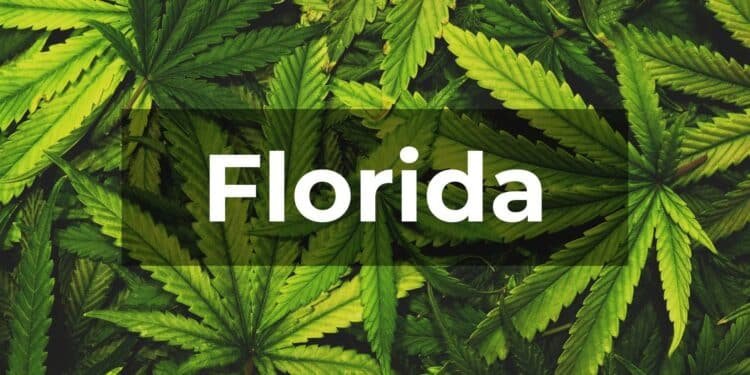Welcome to our comprehensive guide on marijuana laws in Florida. If you’re wondering whether marijuana is legal in Florida, the answer is not a simple one. The state has taken steps towards marijuana legalization, but it remains illegal under federal law.
Florida has made some progress in the legalization of marijuana, particularly in the area of medical marijuana. In 2016, voters passed Amendment 2, which legalized medical marijuana for individuals with qualifying medical conditions. However, recreational use of marijuana remains illegal in Florida.
In this article, we’ll explain the current state of marijuana laws in Florida, including medical and recreational use. We’ll also discuss the penalties for illegal possession, distribution, and cultivation of marijuana. Keep reading to learn more about Florida marijuana laws.
Understanding Florida Cannabis Laws
Florida has some of the strictest cannabis laws in the United States. While medical marijuana is legal, recreational use is not. Let’s take a closer look at what that means for Floridians.
Medical Marijuana in Florida
Florida voters approved the use of medical marijuana in 2016. This means that individuals who suffer from certain medical conditions can use cannabis as a form of treatment with a doctor’s recommendation. Qualifying conditions include cancer, epilepsy, glaucoma, HIV/AIDS, Crohn’s disease, Parkinson’s disease, multiple sclerosis, and more.
To obtain medical marijuana in Florida, a patient must first get a recommendation from a qualified physician and apply for a Medical Marijuana Use Registry Identification Card. Once approved, patients can purchase cannabis from a licensed dispensary.
Florida Cannabis Possession Laws
Unapproved use or possession of cannabis in Florida is illegal and can result in criminal charges. Possession of less than 20 grams of marijuana is considered a misdemeanor and can result in up to one year in jail and a fine of up to $1,000. Possession of more than 20 grams is considered a felony and can result in up to five years in prison and a fine of up to $5,000.
Florida Cannabis Distribution Laws
The distribution of cannabis in Florida is illegal and can result in criminal charges. Distribution of less than 20 grams of marijuana is considered a misdemeanor and can result in up to one year in jail and a fine of up to $1,000. Distribution of more than 20 grams is considered a felony and can result in up to 15 years in prison and a fine of up to $10,000.
Florida Cannabis Cultivation Laws
The cultivation of cannabis in Florida is illegal and can result in criminal charges. Cultivation of less than 25 cannabis plants is considered a felony and can result in up to five years in prison and a fine of up to $5,000. Cultivation of more than 25 plants is considered a felony and can result in up to 15 years in prison and a fine of up to $10,000.
It is important to note that these penalties can be increased for aggravating factors such as selling to minors, committing a drug offense in a school zone, or using a firearm in the commission of a drug crime.
Recreational Marijuana in Florida
As of now, recreational marijuana is illegal in Florida. Possession of small amounts (less than 20 grams) of marijuana for personal use is considered a first-degree misdemeanor, punishable by a maximum sentence of one year in jail and a fine of up to $1,000. Possession of larger amounts, or intent to sell, is a felony offense.
There have been efforts to legalize recreational marijuana in Florida, but they have not yet been successful. In 2019, a group called Make it Legal Florida began collecting signatures to put a measure on the 2020 ballot to legalize adult-use cannabis. However, the campaign was scrapped due to the COVID-19 pandemic.
Although recreational use is currently illegal, medical marijuana is legal in Florida for qualifying patients. Patients can obtain a medical marijuana card after being diagnosed with a qualifying medical condition and receiving a recommendation from a certified physician.
If you have been charged with a marijuana-related offense, it is important to consult with a criminal defense attorney who is experienced in handling drug cases in Florida. They can provide guidance on the best course of action to take to minimize the potential consequences.
History of Marijuana Legalization in Florida
Efforts to legalize marijuana in Florida date back to the 1970s, when a ballot initiative to decriminalize possession failed to pass. However, the issue gained renewed attention in recent years, with advocates pushing for both medical and recreational legalization.
Medical Marijuana Legalization
In 2014, the Florida Legislature passed the Compassionate Medical Cannabis Act, which allowed for the use of low-THC cannabis for patients with qualifying medical conditions. This was expanded in 2016 with the passage of the Florida Medical Marijuana Legalization Initiative, which allowed for the use of medical marijuana for a wider range of conditions.
The program has faced some challenges, including legal battles over regulations and delays in the licensing of medical marijuana dispensaries. However, as of 2021, there are over 500,000 registered medical marijuana patients in Florida, making it one of the largest medical marijuana markets in the country.
Recreational Marijuana Legalization
Efforts to legalize recreational marijuana in Florida have thus far been unsuccessful. In 2019, a ballot initiative called Regulate Florida was proposed, which would have legalized recreational use and regulated marijuana similarly to alcohol. However, the initiative failed to collect enough signatures to make it onto the ballot.
There are ongoing efforts to push for recreational legalization in Florida, with supporters arguing that it would bring significant economic benefits to the state. However, opponents cite concerns about public safety and the potential for increased drug use.
“Marijuana legalization is not a partisan issue; it’s an issue of common sense.” – Nikki Fried, Florida Agriculture Commissioner
Medical Marijuana in Florida
Since the legalization of medical marijuana in Florida in 2016, patients with specific medical conditions have been able to obtain a medical marijuana card, allowing them to legally purchase and use medical marijuana.
To qualify for a medical marijuana card in Florida, patients must have one of the approved medical conditions, which include cancer, glaucoma, HIV/AIDS, Crohn’s disease, Parkinson’s disease, epilepsy, and multiple sclerosis, among others. Patients must also be a resident of Florida and have an established relationship with a qualifying physician who can provide them with a recommendation for medical marijuana.
Once a patient has obtained their medical marijuana card, they can purchase medical marijuana from licensed dispensaries throughout the state. These dispensaries offer a variety of products, including flower, edibles, oils, and tinctures, among others.
It’s important to note that while medical marijuana is legal in Florida, it is still illegal at the federal level. As such, patients who use medical marijuana may still face legal complications, especially if they travel outside of the state with their medication.
Overall, the legalization of medical marijuana in Florida has provided a viable treatment option for patients with qualifying medical conditions. As medical research continues to explore the potential benefits of cannabis, it’s likely that the list of qualifying medical conditions in Florida will continue to grow.
Florida Marijuana Possession Laws
In Florida, possession of marijuana is a criminal offense. The severity of the charge depends on the amount of marijuana found in the individual’s possession, as well as any prior criminal history.
If an individual is found with 20 grams or less of marijuana, they may be charged with a first-degree misdemeanor. The penalties for this charge include up to 1 year in prison and a fine of $1,000.
However, if an individual is found with more than 20 grams of marijuana, they may be charged with a third-degree felony. The penalties for this charge include up to 5 years in prison and a fine of $5,000.
It is important to note that possession of any amount of marijuana may result in a suspension of the individual’s driver’s license for up to 1 year, even if they were not driving at the time of the offense.
In addition, aggravating factors such as possession of marijuana in a school zone or near a park may result in enhanced penalties.
If you are facing charges for marijuana possession, it is important to seek the guidance of a knowledgeable attorney who can help you navigate the legal system and protect your rights.
Florida Marijuana Distribution Laws
In Florida, the distribution or selling of marijuana is illegal. The offense is classified as either a felony or a misdemeanor and carries severe penalties, including imprisonment and fines. The severity of the penalty depends on various factors such as the amount of marijuana distributed, the location, and the age of the recipient.
According to Florida law, the distribution of 20 grams or less of marijuana is considered a misdemeanor. The penalty includes up to one year in jail and a maximum fine of $1,000. However, distribution of more than 20 grams of marijuana is classified as a felony, which can result in imprisonment of up to five years and a maximum fine of $5,000.
Selling or distributing marijuana within 1,000 feet of a school, college, park, or other specified areas can increase the severity of the penalty. The offense is classified as a second-degree felony, which carries a maximum penalty of 15 years’ imprisonment and a fine of up to $10,000.
It is important to note that the intent to distribute marijuana, even if no actual distribution occurs, is still considered a crime in Florida. Possessing marijuana with the intent to distribute is classified as a felony and can result in imprisonment of up to five years and a fine of $5,000.
If you are facing charges for marijuana distribution in Florida, it is important to seek legal counsel immediately. A qualified attorney can help build a strong defense strategy and provide guidance throughout the legal process.
Florida Marijuana Cultivation Laws
In Florida, marijuana cultivation is illegal for both medical and recreational purposes. Cultivation refers to the process of growing, harvesting, and producing marijuana plants. The penalties for cultivation depend on the amount of marijuana being grown, as well as the presence of aggravating factors.
| Amount of Marijuana | Penalty |
|---|---|
| Less than 25 plants | A misdemeanor charge with up to 1 year of imprisonment and a maximum fine of $1,000. In some cases, defendants may be eligible for probation instead of jail time. |
| 25 or more plants | A felony charge with up to 5 years of imprisonment and a maximum fine of $5,000. Defendants may also face additional charges for the cultivation of high-THC cannabis, which carries stricter penalties. |
| 300 or more plants | A first-degree felony charge with up to 30 years of imprisonment and a maximum fine of $200,000. Defendants may face additional charges if the cultivation is part of a larger drug trafficking operation. |
Aggravating factors that may increase the severity of cultivation charges include the cultivation of marijuana in a school zone or the involvement of minors in the cultivation process. Additionally, those who cultivate marijuana illegally may also face federal charges under the Controlled Substances Act.
It is important to note that there are legal channels for obtaining medical marijuana in Florida, including the purchase of cannabis from licensed dispensaries. Patients with qualifying medical conditions may be able to grow their own marijuana plants at home, but only with a valid medical marijuana card and a permit from the Florida Department of Health.
Florida Marijuana DUI Laws
Driving under the influence of marijuana is illegal in Florida. In fact, you can be charged with DUI if you are driving with any amount of THC in your bloodstream. The legal limit in Florida is 5 nanograms or more of THC per milliliter of blood, or 5 nanograms or more of THC per milliliter of urine.
If you are pulled over and suspected of driving under the influence of marijuana, you may be asked to perform a field sobriety test. If you fail the test, you may be arrested and taken to a police station for a breathalyzer or blood test to determine your THC levels.
If you are convicted of a first-time marijuana DUI in Florida, you may face fines, license suspension, and up to 6 months in jail. Subsequent convictions can result in more severe penalties, including longer jail time and higher fines.
If you have a medical marijuana card, it is important to note that you can still be charged with DUI if you are found to have THC in your bloodstream while driving. Having a medical marijuana card does not give you immunity from DUI charges.
It is important to always drive sober and never operate a vehicle under the influence of marijuana or any other substance.
Florida Marijuana Legalization FAQs
Here are some frequently asked questions about Florida’s marijuana laws:
What is the difference between medical and recreational marijuana in Florida?
Medical marijuana is legal in Florida for patients with qualifying conditions who have obtained a medical marijuana card from a licensed physician. Recreational marijuana is still illegal in Florida and possession, sale, and distribution can result in serious legal consequences.
What are the penalties for marijuana possession in Florida?
The penalties for marijuana possession in Florida depend on the amount and whether the possession was for personal use or for distribution. Possession of less than 20 grams of marijuana is a misdemeanor offense, but possession of larger amounts can result in felony charges and significant jail time.
How do I obtain a medical marijuana card in Florida?
In order to obtain a medical marijuana card in Florida, you must first be diagnosed with a qualifying medical condition by a licensed physician. Once you have a diagnosis, you can apply for a medical marijuana card through the Florida Department of Health and then purchase medical marijuana from a licensed dispensary.
Can I grow my own marijuana in Florida if I have a medical marijuana card?
Under Florida law, patients with medical marijuana cards are not currently allowed to grow their own marijuana plants. All medical marijuana must be obtained from a licensed dispensary.
What are the legal limits for THC in the bloodstream while driving in Florida?
In Florida, there is a legal limit of 5 nanograms of THC per milliliter of blood for driving with marijuana impairment. However, it is important to note that THC can stay in the bloodstream for days or even weeks after use, so it is possible to test positive for THC even if you are not currently impaired.
What should I do if I am facing marijuana-related charges in Florida?
If you are facing charges related to marijuana possession, distribution, or DUI in Florida, it is important to contact an experienced criminal defense attorney as soon as possible. A knowledgeable attorney can help you understand your legal options and work to protect your rights in court.
Conclusion
Overall, marijuana laws in Florida can be complex and vary depending on the circumstances. While medical marijuana has been legalized and dispensaries are available throughout the state, recreational use is still prohibited. Possession, distribution, cultivation, and impaired driving charges can all result in serious consequences, including fines, jail time, and a criminal record.
It’s important for individuals to educate themselves on the current laws and regulations surrounding marijuana use in Florida to avoid any legal issues. As the attitudes towards marijuana continue to shift, it will be interesting to see if recreational use will eventually be legalized in the state.














